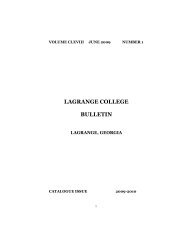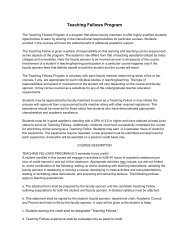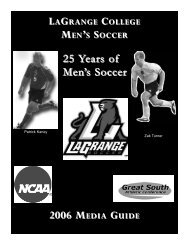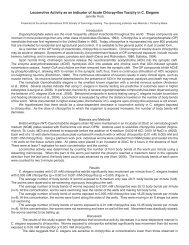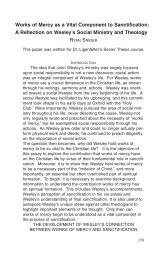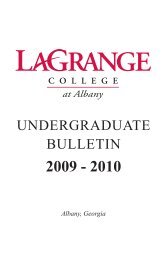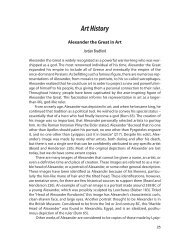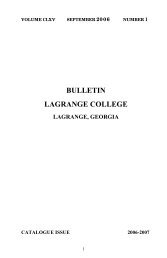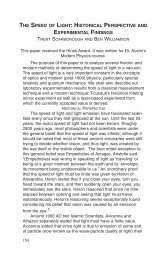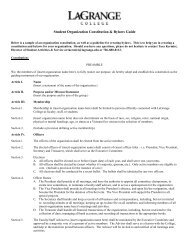undergraduate bulletin - LaGrange College
undergraduate bulletin - LaGrange College
undergraduate bulletin - LaGrange College
Create successful ePaper yourself
Turn your PDF publications into a flip-book with our unique Google optimized e-Paper software.
students with theoretical frameworks for understanding the dynamics and intersections of<br />
oppression and an opportunity to expand their awareness of various forms of oppression.<br />
RLGN 2320 Religion, Violence, and Social Change. (3)<br />
An examination of models of non-violent social change that are grounded in religious faith<br />
commitments. The course will focus on the Christian faith tradition but works comparatively<br />
with figures and movements from Hinduism, Buddhism, Judaism, and Islam. The course<br />
includes practice in the skills of peace-building that are guided by the principles of restorative<br />
justice.<br />
POLS 2320<br />
or Seminar on Ecological Sustainability and Policy. (3)<br />
SOCI 2320<br />
A survey of sustainability as a political, economic and socio-cultural part of our lives. The course<br />
is divided into three major segments. First, it assays how our lives are conducted and considers<br />
the ecological cycles and processes that make life possible. Second, it examines the ground<br />
solutions to the issue of a sustainable lifestyle and attempts to implement this goal. Finally, it<br />
surveys the arena of ecological politics in order to engage the issue of how can we achieve this as<br />
a society.<br />
BIOL 3334 General Ecology. (4)<br />
or<br />
BIOL 3370 Toxicology. (4)<br />
General Ecology is an introduction to the basic principles and concepts of ecology with emphasis<br />
on environmental sampling, analysis, and characterization. Toxicology is an introduction to the<br />
principles of toxicology and the cellular, physiological, and ecological effects of toxicants, with<br />
an emphasis on the environmental and physiological effects of toxicants relating to the nervous<br />
system, cardiovascular system, and respiratory systems.<br />
Prerequisites: General Ecology (BIOL 3334) and Toxicology (BIOL 3370) both<br />
require as a prerequisite the General Biology sequence (BIOL 1107, 1107L, 1108,<br />
1108L) reserved for Biology majors. Oikos students who are not Biology majors<br />
will require special permission from instructors to take these courses.<br />
OIKS 4000 Capstone Research Project. (3)<br />
A research project and presentation that explore in great depth an issue at the intersection of<br />
peace and nonviolence, social justice, and ecological sustainability. If the student is completing a<br />
major that requires a senior research project, then the student may register for the departmental<br />
capstone course instead of OIKS 4000. The student must work out a common topic in<br />
consultation with the Oikos program director and the faculty member who teaches the capstone<br />
course in the student‘s major. In those rare cases in which the student is earning a major that<br />
does not require a senior project, or if the student cannot develop a topic that is acceptable to his<br />
or her major advisor, then the student may register for OIKS 4000 instead of a departmental<br />
capstone course. In this case, the student must choose a topic in consultation with the Oikos<br />
program director.<br />
Prerequisite: Completion of all other Oikos courses with a grade of ―C-‖ or better<br />
and a GPA of 2.0 or higher in the minor, or permission of the Oikos Program<br />
Director.<br />
213



